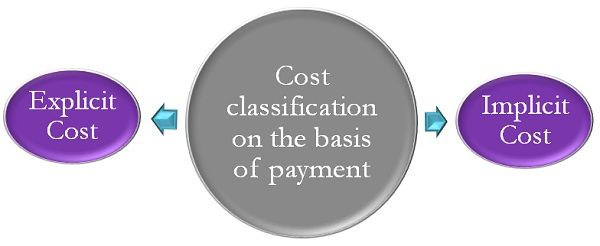 Based on payment, costs are classified into two categories; they are Explicit Costs and Implicit Costs. Explicit Cost is the cost which is actually incurred by the organization, during production. On the other hand, Implicit Cost, are just opposite to the explicit cost, as the organization does not directly incur them, but they are implied in nature which does not involve a cash payment. The former is an out of pocket cost, while the latter is an opportunity cost.
Based on payment, costs are classified into two categories; they are Explicit Costs and Implicit Costs. Explicit Cost is the cost which is actually incurred by the organization, during production. On the other hand, Implicit Cost, are just opposite to the explicit cost, as the organization does not directly incur them, but they are implied in nature which does not involve a cash payment. The former is an out of pocket cost, while the latter is an opportunity cost.
Explicit Cost refers to the one paid to the factors outside the firm. Conversely, Implicit Cost are the one that arise from using the asset rather than renting it out. There are a number of differences between explicit cost and implicit cost, which has been explained in the article presented below, have a look.
Content: Explicit Cost Vs Implicit Cost
Comparison Chart
| Basis for Comparison | Explicit Cost | Implicit Cost |
|---|---|---|
| Meaning | The costs which involve outflow of cash due to the use of factors of production is known as Explicit Cost. | The costs in which there is no cash outlay, is known as Implicit Cost. |
| Alternatively known as | Out-of-pocket Costs | Imputed Costs |
| Occurrence | Actual | Implied |
| Recording and Reporting | Yes | No |
| Estimation of Cost | Objective | Subjective |
| Which profit can be calculated with the help of cost? | Accounting Profit and Economic Profit | Economic Profit |
| Example | Salaries, rent, advertisement, wages, etc. | Interest on owner's capital, Salary to owner, rent of owner's building, etc. which do not occur in reality. |
Definition of Explicit Cost
Explicit Costs are the costs which involve an immediate outlay of cash from the business. The cost is incurred when any production process is going on, or activity is conducted in the normal course of business. The cost is a charge for the use of factors of production like land, labour, capital and so on. They are in the form of rent, salary, material, wages, and other expenses like electricity, stationery, postage, etc.
Explicit Costs show that payment has been made to outsiders, while business is carried on. The recognition and reporting of the explicit cost are very easy because they are recorded when they arise. They show that an amount has been spent over a business transaction. They can be calculated in terms of money.
Recording of the explicit cost is very important because it helps in the calculation of profit as well as it fulfils purposes like decision-making, cost control, reporting, etc.
Definition of Implicit Cost
Implicit Cost, also known as the economic cost, is the cost which the company had foregone while employing the alternative course of action. They do not involve any outflow of cash from the business. It is the value of sacrifice made by the entity at the time of exercising some other action. The cost occurs when an asset is used as a factor of production by the entity instead of renting it out.
As they are not actually incurred they cannot be easily measured, but they can be estimated. They are not recorded in the books of accounts as well as these are not reported. The purpose of ascertaining the implicit cost is that it helps in decision making regarding the replacement of any asset and much more.
Implicit costs have a direct impact on the profitability and performance of the company. Some common examples of implicit costs are Interest on owner’s capital, salary to the proprietor, etc. which are not actually incurred but they exist.
Key Differences Between Explicit Cost and Implicit Cost
The following are the major differences between explicit cost and implicit cost
- Explicit Cost is incurred when the entity has to pay for the utilisation of factors of production. Implicit Cost is the opportunity cost, which is incurred when the entity uses the owner’s resources like capital inventory etc.
- Explicit Cost is also known as out-of-pocket cost while Implicit costs are known as imputed cost.
- Explicit Cost can be easily ascertained, but it is just opposite in the case of Implicit Cost as it does not have any paper trail.
- The measurement of Explicit Cost is objective in nature because it is actually incurred whereas Implicit Cost occurs indirectly and that is why its measurement is subjective.
- Explicit Cost helps in the calculation of both accounting profit and economic profit. Conversely, Implicit Cost helps in the calculation of only economic profit.
- Explicit Cost is recorded and reported to the management. On the other hand, the implicit cost is neither recorded nor reported to the management of the company.
Conclusion
Now you may wonder that Which type of cost depreciation is? So depreciation is a Deemed Explicit Cost, as the cost of the asset is apportioned during the useful life of the asset. So in this way, the two types of costs differ.






lewis says
thanx
Raz says
This was very helpful! Thanks ?
Pranjali Agarwal says
Good explanation
Owais Ahmmed Kumbhar says
Helpful
shridhar says
thanks
Fits says
thanks very well explained